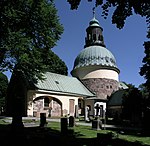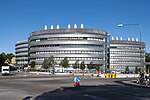Karolinska University Hospital

The Karolinska University Hospital (Swedish: Karolinska universitetssjukhuset) is a teaching hospital affiliated with Karolinska Institutet in Stockholm, Sweden, with two major sites in the municipalities of Solna and Huddinge. The hospital network is the second largest in Sweden, after Sahlgrenska University Hospital. The present day Karolinska University Hospital is the result of a 2004 merger between the former Huddinge University Hospital (Huddinge universitetssjukhus) in Huddinge, south of Stockholm, and the Karolinska Hospital (Karolinska sjukhuset) in Solna, north of Stockholm. The new hospital has about 15,000 employees and 1,340 patient beds. The Karolinska University Hospital is closely affiliated with the Karolinska Institutet. It incorporates the Astrid Lindgren Children's hospital in Solna and the Children's Hospital in Huddinge. The Karolinska University Hospital in Solna is being replaced by the New Karolinska Solna University Hospital.
Excerpt from the Wikipedia article Karolinska University Hospital (License: CC BY-SA 3.0, Authors, Images).Karolinska University Hospital
Karolinska vägen, Solna kommun
Geographical coordinates (GPS) Address Nearby Places Show on map
Geographical coordinates (GPS)
| Latitude | Longitude |
|---|---|
| N 59.352222222222 ° | E 18.032222222222 ° |
Address
Rolf Luft Centrum
Karolinska vägen
171 76 Solna kommun, Solna Kyrkby
Sweden
Open on Google Maps









